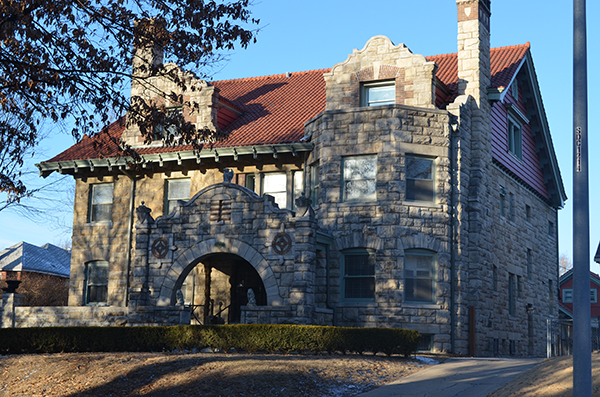Paul Thompson
Northeast News
For less than $300 per night, anyone with an Airbnb account can reserve a luxurious five-bedroom, 3.5-bath mansion for up to 14 guests in the heart of the Historic Northeast’s Scarritt Renaissance neighborhood.
Accommodations at the historic, 121-year-old mansion include seven fireplaces, mahogany walls and doors, a parlor with a piano, a TV room with a 60” high definition smart TV, an elegant wrap-around porch, and 8,000 square-feet of space.
The historic home is just one of the hundreds of short-term rental properties that would be impacted by Ordinance No. 170771, proposed legislation making its way through Kansas City, Missouri City Council. The ordinance would codify short-term rental language in the city and potentially outlaw the practice in two single-family zoning districts: R-7.5 and R-10. However, residents who live in a historic district that is zoned R-7.5 or R-10 would be allowed to apply for a special use permit. Similarly, those who operated short-term rentals before the ordinance would go into effect can also apply for a special use permit.
Scarritt Renaissance is zoned R-7.5, putting it right in the crosshairs of Ordinance No. 170771. While the Scarritt Airbnb mansion could technically be effectively “grandfathered” into the ordinance because it’s already in operation. The issue might be more complicated than that in this instance: at least two adjacent neighbors have suggested to the Northeast News that they would object to the continued use of the property as an Airbnb, citing concerns about noise and parking at a space that can attract a boisterous crowd.
Shane Wilson lives next door to the Scarritt Airbnb mansion. He says that there have been multiple times where there is some sort of filming or photography going on next door. When that happens, there are flashing bulbs, dozens of people milling about and cars lining the street. Wilson estimates that in one instance, there must have been 70 people in the house.
Though he doesn’t necessarily oppose the idea of Airbnb, Wilson said that he’s wary of living next door to a rental house where parties are common.
“Imagine that happening three times a week, and the people who are partying are people that you don’t have a relationship with,” Wilson said.
Kathy Velander, who lives in an apartment across the street from the Airbnb, said that the parking issue is her greatest ongoing concern. Velander added that she doesn’t believe that short term rentals should be allowed in her neighborhood.
“These people have spent hundreds and thousands of dollars renovating these old houses in this neighbhorhood,” Velander said. “They should be single family houses, not crazy little rent-by-the-night places.”
Public reviews of the Scarritt Airbnb mansion show a largely positive experience for guests. It’s clear that the home has been well maintained, as many of the guests raved about the architectural beauty and decor. The property has obviously hosted a variety of events: one review lauded the mansion as an ideal location for a dinner party to celebrate an engagement; another described spending Christmas with more than a dozen family members, and the comfort of fitting the whole group around one table. One reviewer described the mansion as an ideal location for a Roaring Twenties-themed birthday party.
The night-to-night uncertainty has been an issue for Wilson. He would like to see a mechanism for neighbors to have their voices heard when short-term rental homes cause disturbances in the neighborhood. As of now, Wilson doesn’t believe that the City is capable of responding in a timely manner to relatively minor concerns like noise complaints.
“Somebody literally broke into my house, and it took the police nine hours to get there,” Wilson said. “They’re not coming for a noise complaint.”
In it’s protracted negotiations towards an ordinance, the City has worked diligently to address concerns of neighborhood leaders and short-term rental advocates alike. During work sessions organized by 6th District Councilman Scott Taylor, stakeholders on both sides agreed include language in the ordinance that would impose a modest per-night fee to fund codes enforcement efforts aimed specifically for short-term rentals.
The City has also proposed dividing the short-term rental market into two tiers. Type one includes owner-occupied residences that are rented for no greater than 95 days per calendar year. No more than eight guests could stay in any dwelling unit at a given time (a potential issue for the Scarritt mansion), and all prospective units would need to provide notice to adjacent property owners of STR intent. The property would also need to be registered for $100, with an additional annual registration fee of $50. Type two would include single or multi-family structures that are not owner-occupied. Guest limits also apply, and owners would be required to acquire the consent of 55% of adjacent property owners to use the space for short-term rentals. A $259 registration fee would apply, along with the $50 annual registration fee.
During the Planning, Zoning and Economic Development committee meeting on Feb. 7, City Council members took up a second committee substitute to Ordinance No. 170771. The committee recognized that the short-term rental legislation – particularly the restrictions to R-7.5 and R-10 – might be controversial. That’s why, after a year of implementation the Council would look back at the legislation and make any necessary adjustments.
At every turn, there are parallels to the City’s efforts to codify language for ride-sharing platforms such as Uber and Lyft. In that instance, after KCMO instituted stringent background checks for ride-sharing drivers, the industry set out for Jefferson City to find a better deal. In 2017, Missouri Governor Eric Greitens signed more industry-friendly ride-sharing legislation into law, effectively circumventing hard-fought concessions won by Kansas City’s ordinance.
Kansas City’s diligence on its years-in-the-making STR ordinance threatens to lead the City down the same path. As the City Council prepares to weigh a short-term rental ordinance that was passed out of the Planning, Zoning, and Economic Development committee last week – dubbed a ‘Kansas City solution’ by PZED chair Taylor – legislators in Jefferson City are already working on a bill that would preempt Kansas City’s ordinance.
KCMO Council members are well aware of the looming threat from Jefferson City. During the short-term rental discussion on Feb. 7, 4th District Councilwoman Kathy Shields brought up the potential of preemption from the legislature almost immediately. Shields worried that some aspects of Kansas City’s ordinance could be undercut by a state law that deemed the restrictions to R-7.5 and R-10 as unreasonable. If the ordinance is preempted, Shields voiced concerns that other regulations proposed by the City could also be at risk.
“In terms of things like the 55% approval rate from neighbors, an appeal to the Board of Zoning Adjustment, the limit of number of short term rentals to either one per building or 25% of the units in a building; all of those I think are hard-fought-for elements of our local regulation,” Shields said.
Committee chair Scott Taylor, however, told Shields and the rest of the board that he didn’t want to legislate with Jefferson City in mind.
“It’s a concern of the industry, and they’ve raised it at all of the work sessions. I will say that the industry has been respectful; we’ve had good work sessions, and it’s been a good give and take,” Taylor said. “But I just disagree with the industry on this one, based on input from our neighborhoods.”
“I personally am frustrated with some of the decisions they make in Jefferson City. I don’t agree with them, whether it’s this or gun policy,” Taylor added. “I’m not going to legislate defensively, because I don’t think our citizens expect it.”
The industry remains fervently opposed to the exclusion R-7.5 and R-10, while some neighborhood leaders, especially in South Kansas City, remain concerned that allowing STR in their community will negatively impact property values and cause issues with neighbors.
Bob McCullom, who rents out his home in an R-5 district, advocated for the inclusion of all zoning districts in his public testimony on Feb. 7.
“My ox isn’t being gored, but I want to speak for the people who are in R-7.5 and R-10. I have had 1,110 guest nights at my house in the past nine years; 400 guests,” McCollom said. “I have not had a bad guest; I have not had a bad guest interact with any of my neighbors. This stranger danger about rolling bags in the neighborhood is getting totally blown out of proportion.”
McCullom added that outlawing short term rental in specific districts is akin to “reaching into their pocket and stealing money from them.”
Former 6th District Councilman and current South Kansas City Alliance representative John Sharp invoked the parallels to the City’s ride-sharing debate during his own public testimony, but nevertheless suggested that Kansas City can’t assume legislation will pass in Jefferson City when it hasn’t even been filed yet.
“We’ve been through this before…I remember all the negotiations we had with Uber,” said Sharp. “We came to an agreement, shook hands, and everything was fine. The ink wasn’t even dry, and they’re down in Jeff City trying to override it; and they did. We shouldn’t let this threat deter you from doing what’s best for our city.”
Once public testimony concluded and the committee began discussing the ordinance, some committee members expressed hesitance to pursue the legislation under the shadow of legislative preemption. Ultimately, the body opted to vote the legislation out of committee without a recommendation. The move will allow the full Council additional time to modify the ordinance over the coming weeks.
Wilson, for one, has questions he’d like answered by the final ordinance.
“Does he have a limit to how many people can be there? What if my yard is trashed? Do I have an Airbnb hotline?” Wilson asked.
“There’s going to be more trash, there’s going to be more cars, and there’s going to be more noise,” Wilson added. “It has really made me more conscious of my own presence when I’m an Airbnb guest, wondering how the neighbors feel about it.



















